2014届高考英语(人教版)复习教学案:选修7 Unit 5 Travellingabroad
- 格式:pdf
- 大小:194.59 KB
- 文档页数:6
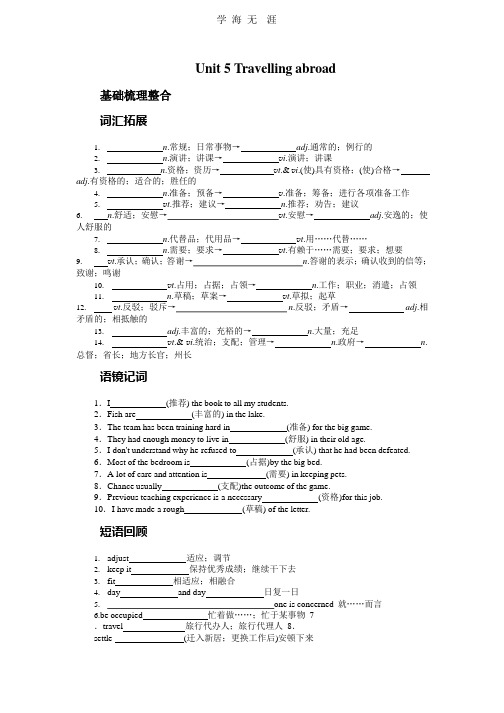
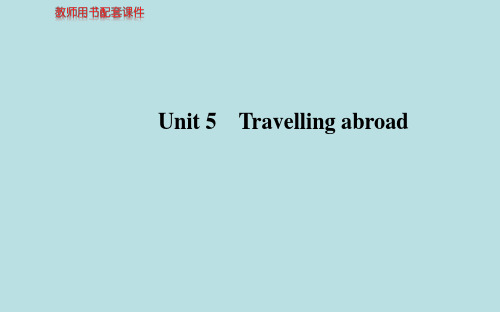

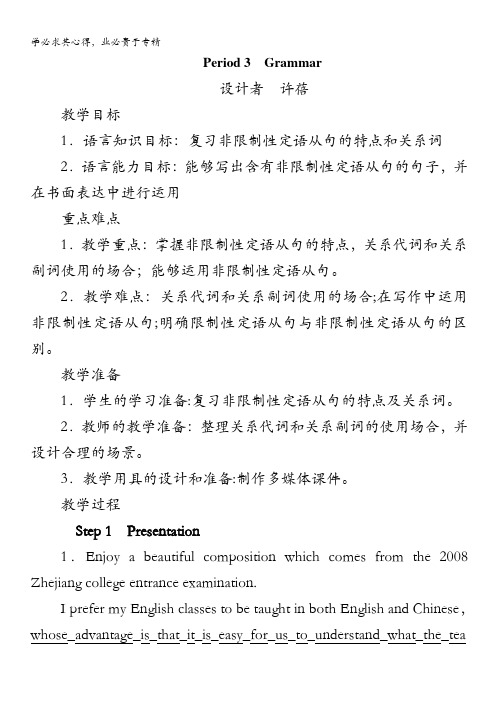
Period 3Grammar设计者许蓓教学目标1.语言知识目标:复习非限制性定语从句的特点和关系词2.语言能力目标:能够写出含有非限制性定语从句的句子,并在书面表达中进行运用重点难点1.教学重点:掌握非限制性定语从句的特点,关系代词和关系副词使用的场合;能够运用非限制性定语从句。
2.教学难点:关系代词和关系副词使用的场合;在写作中运用非限制性定语从句;明确限制性定语从句与非限制性定语从句的区别。
教学准备1.学生的学习准备:复习非限制性定语从句的特点及关系词。
2.教师的教学准备:整理关系代词和关系副词的使用场合,并设计合理的场景。
3.教学用具的设计和准备:制作多媒体课件。
教学过程Step 1Presentation1.Enjoy a beautiful composition which comes from the 2008 Zhejiang college entrance examination.I prefer my English classes to be taught in both English and Chinese,whose_advantage_is_that_it_is_easy_for_us_to_understand_what_the_teacher_talks_about。
The teacher first teaches the class in English,and then she explains those that_are_hard_to_understand_to_us so that we get a better understanding of the passage.That will be good for us。
However,teaching the class in two languages will make the English atmosphere not so strong.Some students who_wish_to_be_taught_in_English_will be disappointed。
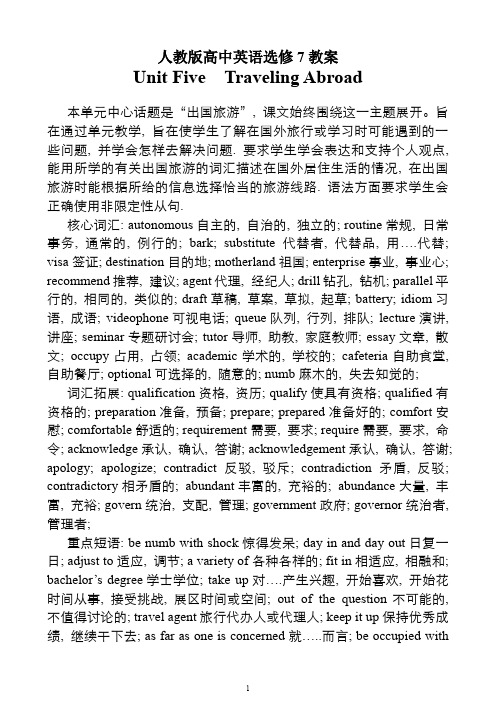
人教版高中英语选修7教案Unit Five Traveling Abroad本单元中心话题是“出国旅游”, 课文始终围绕这一主题展开。
旨在通过单元教学, 旨在使学生了解在国外旅行或学习时可能遇到的一些问题, 并学会怎样去解决问题. 要求学生学会表达和支持个人观点, 能用所学的有关出国旅游的词汇描述在国外居住生活的情况, 在出国旅游时能根据所给的信息选择恰当的旅游线路. 语法方面要求学生会正确使用非限定性从句.核心词汇: autonomous自主的, 自治的, 独立的; routine常规, 日常事务, 通常的, 例行的; bark; substitute代替者, 代替品, 用….代替; visa签证; destination目的地; motherland祖国; enterprise事业, 事业心; recommend推荐, 建议; agent代理, 经纪人; drill钻孔, 钻机; parallel平行的, 相同的, 类似的; draft草稿, 草案, 草拟, 起草; battery; idiom习语, 成语; videophone可视电话; queue队列, 行列, 排队; lecture演讲, 讲座; seminar专题研讨会; tutor导师, 助教, 家庭教师; essay文章, 散文; occupy占用, 占领; academic学术的, 学校的; cafeteria自助食堂, 自助餐厅; optional可选择的, 随意的; numb麻木的, 失去知觉的;词汇拓展: qualification资格, 资历; qualify使具有资格; qualified有资格的; preparation准备, 预备; prepare; prepared准备好的; comfort安慰; comfortable舒适的; requirement需要, 要求; require需要, 要求, 命令; acknowledge承认, 确认, 答谢; acknowledgement承认, 确认, 答谢; apology; apologize; contradict反驳, 驳斥; contradiction矛盾, 反驳; contradictory相矛盾的; abundant丰富的, 充裕的; abundance大量, 丰富, 充裕; govern统治, 支配, 管理; government政府; governor统治者, 管理者;重点短语: be numb with shock惊得发呆; day in and day out日复一日; adjust to适应, 调节; a variety of各种各样的; fit in相适应, 相融和; bachelor’s degree学士学位; take up对….产生兴趣, 开始喜欢, 开始花时间从事, 接受挑战, 展区时间或空间; out of the question不可能的, 不值得讨论的; travel agent旅行代办人或代理人; keep it up保持优秀成绩, 继续干下去; as far as one is concerned就…..而言; be occupied with忙着做…., 忙于某事; settle in安顿下来;重点句型:“It’s not just study that’s difficult. You have to get used to a whole new way of life, which can take up all your concentration in the beginning,”explained Xie Lei, who had live all her life in the same city in China.I have been so occupied with work that I haven’t had time for social activities.主要语法: 定语从句(非限定性从句)Period One Warming up and Reading Task Teaching goals:Talk about traveling or living in another country.Enable the students to discuss what they would learn when traveling or living in another country.Discuss the problems and dangers that could happen while traveling in a foreign country and the solution.Teaching important points:Train students’ speaking abilityTrain students’ reading abilityTeaching difficult points:How to deal with the problems that are likely to happen when traveling and how to prevent themStep 1 Warming upShow the beautiful scenery of other countries to attract students’attention, including Taj Mahal, the Pyramids of Egypt, London Bridge, Sydney Opera House, Eiffel Tower, Statue of Liberty, Stonehenge, New Zealand, South America, etc.Questions:1) Are you eager to travel abroad to enjoy the beautiful scenery by yourself?2) If you could go anywhere in the world, which country would you like to visit and why?3) What kind of things would you learn by being a tourist in a country and what would you learn best by working or studying there?(Suggested answers: architecture; places of interest; the economic situation; manners and customs; the proprieties of the country; slang; the differences in time, food, transportation; destinations; route;) Step 2 Reading taskSo, in strange surroundings, any unexpected things may happen. Now, turn to Page 82, try to list the dangers and problems, then discuss ways you could prevent theses things happening in groups.1. What problems did each traveler have? Did you guess correct? What2. Work with a partner. Complete the advice to travelers.1) When changing plans, __________________________________.2) If you have to take special medicine while traveling overseas, _______.3) If traveling alone, ____________________________________.4) When traveling, always wear ____________________________.Step 3 Homework1) Learn the new words and expressions by heart.2) Let students talk about their experiences of traveling.Period two Reading语言知识目标:1)学生能正确运用以下单词: lecture; recommend; preparation; comfort; academic; requirement; acknowledge; occupy; contradict; substitute;2)掌握下列词组的意思并能在句子中熟练运用: keep it up; fit in; get / be used to; as far as one is concerned; be occupied with;语言技能目标:学会表达和支持个人观点, 能用traveling abroad的词汇描述在国外居住生活或者学习的情况.情感态度和文化意识目标:1)帮助学生树立国际意识, 培养学生跨文化交际能力.2)培养学生坚强的意志, 坚定克服困难迎接挑战的能力.3)在小组合作互动中, 增强学生的团队合作与分享意识.重难点: 使学生了解在国外旅行和学习时可能会遇到的一些问题, 并学会怎样去解决问题和避免这些问题的发生.Step 1 Pre-readingRecent years, more and more Chinese students have chosen to study abroad. It has become a tendency. Do you think it is a good thing or not? Would you like to study in a foreign country? Why or why not?Step 2 Fast-reading1) What is Xie Lei in England for? How long has she been in England?________________________________________________________.2) Why is she doing a preparation course first?________________________________________________________.3) What are some of the difficulties she was faced with when she first came to England_____________________________________________.4) Which two types of people have helped Xie Lei most since she came to England?_____________________________________________________.Step 3 Detailed reading1. Summarize the main idea of each paragraphPara1: __________________________________________________.Para2: __________________________________________________.Para3: __________________________________________________.Para4: _________________________________________________.Para5: __________________________________________________.Para6: ___________________________________________________.Para7:___________________________________________________2. 根据课文内容填空.3. Find out the details about benefits she got and difficulties she met in4. 根据课文内容选出可以填入空白处的最佳答案.1) Xie Lei choose to board with an English family so that she _______.A. can learn the new lifestyle and customB. can save a lot of moneyC. will not feel lonely in a foreign languageD. can live a comfortable life2) Xie Lei thinks the preparation year is beneficial because ______.A. studying in a foreign country is not quite different from studying in China.B. it is difficult to adjust to the new way of life.C. she is like a child who needs to be looked after.D. she can spend less time in studying.3) According to the text, we can know that _______.A. idioms are not so difficult to understandB. foreign students need one year to prepare for their majorsC. foreign tutors admire the autonomous learnerD. it is impossible that you read it from China Daily5. Discussion: We have talked about the difficulties and benefits of studying in a foreign country. Now let’s list the problems that Xoe Lei hadStep 4 Further reading1. adjust (sth / oneself) to sth.: 使适合新环境, 适应Could I adjust to Chinese life at 72?The body quickly adjusts itself to changes in temperature.身体迅速自行调节以适应气温的变化.2. habit: 指个人的习惯, 通常用于表示做事, 思考问题或行为, 兴趣举止的不自觉的方式或方法. practice: 即可以表示个人的也可以表示社会的习惯, 这种习惯是一种反复不断或者是有选择性的行为和方式. custom: 指风俗习惯, 按照某地区人们共同生活极其行为准则和规范, 它不仅有指导意义, 而且有必须遵循的意义.I’ve got the habit of turning on TV as soon as I get home.On the other hand, your stomach would turn at the idea of frying potatoes in animal fat—the normally accepted practice in many other countries.在另一方面, 一想到动物油煎马铃薯, 你便会作呕---然而在许多其他的国家里, 这是被大家所接受的习惯.Don’t be slave to the custom. 不要作风所习惯的奴隶.From the moment of birth, the _____ into which he is born shape his experience and behavior.A. habitsB. practicesC. conceptsD. customs3. take it easy: 别着急, make it: 成功;Well done, and keep it up, Tom!As long as you keep it up, you will succeed.只要你坚持, 你就会成功的.4. fit in: 相适应, 相融合; fit in with:与…..相适应, 与….相融合; be fit for: 胜任; be fit to do sth: 适合做某事; keep fit: 保持健康;Do our plans fit it in with your arrangement?我们的计划和你的安排相符合吗?We should learn to fit in with the changing situation.我们应该学会适应不断变化的形势.与keep相关的短语: keep one’s head / temper:保持冷静, 强压怒火; keep a school / family / diary:开办学校/ 养家糊口/ 写日记; keep one’s word / keep one’s promise:履行诺言; keep the law:守法; keep an eye on:照看, 密切注视; keep in touch with:与…..保持联系; keep up:保持不落后, 维持, 继续; keep up with:跟上, 保持同步; keep away:远离, 不接触; keep to sth:信守, 坚持, 不违背诺言; keep….from doing sth:避开, 禁止, 克制;The police asked the people to keep away from the scene of the accident. Though things changed, but she kept up.尽管情况有变, 她依然我行我素.He kept his conclusion to himself. 他对他的结论守口如瓶.You can depend on him, for he always keeps his words (说话算数的). (keep)5. It / This is / was the + 序数词+ time + that从句: 固定句型, “这是某人第几次干….”, 从句中的时态要用完成时.This is the first time I have been here.It was the third time that our teacher had talked with me.It is (about / high) time + that 从句: “某人早该干…..”, 从句中谓语动词要用虚拟语气.It’s (about / high) time we started.It’s time for sb. to do sth. 是该某人做某事的时候了.It’s time for us to get down to marking the papers.It was the first time in her life that she had seen the sea (她看到大海)。
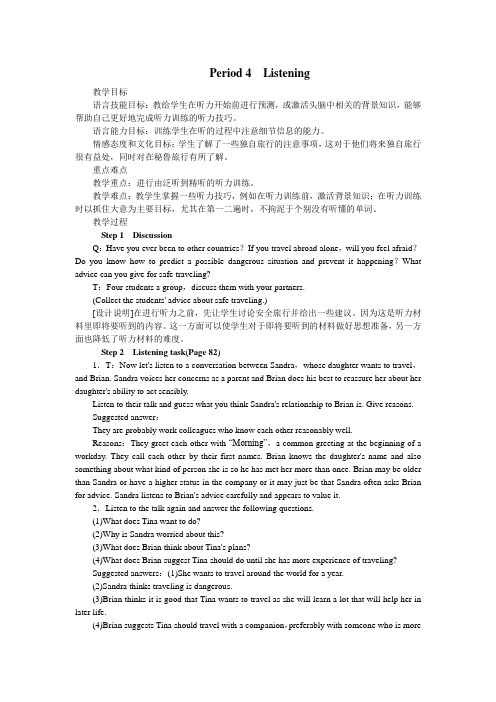
Period 4Listening教学目标语言技能目标:教给学生在听力开始前进行预测,或激活头脑中相关的背景知识,能够帮助自己更好地完成听力训练的听力技巧。
语言能力目标:训练学生在听的过程中注意细节信息的能力。
情感态度和文化目标:学生了解了一些独自旅行的注意事项,这对于他们将来独自旅行很有益处,同时对在秘鲁旅行有所了解。
重点难点教学重点:进行由泛听到精听的听力训练。
教学难点:教学生掌握一些听力技巧,例如在听力训练前,激活背景知识;在听力训练时以抓住大意为主要目标,尤其在第一二遍时,不拘泥于个别没有听懂的单词。
教学过程1DiscussionQ:Have you ever been to other countries?If you travel abroad alone,will you feel afraid?Do you know how to predict a possible dangerous situation and prevent it happening?What advice can you give for safe traveling?T:Four students a group,discuss them with your partners.(Collect the students' advice about safe traveling.)[设计说明]在进行听力之前,先让学生讨论安全旅行并给出一些建议。
因为这是听力材料里即将要听到的内容。
这一方面可以使学生对于即将要听到的材料做好思想准备,另一方面也降低了听力材料的难度。
2Listening task(Page 82)1.T:Now let's listen to a conversation between Sandra,whose daughter wants to travel,and Brian. Sandra voices her concerns as a parent and Brian does his best to reassure her about her daughter's ability to act sensibly.Listen to their talk and guess what you think Sandra's relationship to Brian is. Give reasons.Suggested answer:They are probably work colleagues who know each other reasonably well.Reasons:They greet each other with “Morning”,a common greeting at the beginning of a workday. They call each other by their first names. Brian knows the daughter's name and also something about what kind of person she is so he has met her more than once. Brian may be older than Sandra or have a higher status in the company or it may just be that Sandra often asks Brian for advice. Sandra listens to Brian's advice carefully and appears to value it.2.Listen to the talk again and answer the following questions.(1)What does Tina want to do?(2)Why is Sandra worried about this?(3)What does Brian think about Tina's plans?(4)What does Brian suggest Tina should do until she has more experience of traveling?Suggested answers:(1)She wants to travel around the world for a year.(2)Sandra thinks traveling is dangerous.(3)Brian thinks it is good that Tina wants to travel as she will learn a lot that will help her in later life.(4)Brian suggests Tina should travel with a companion,preferably with someone who is moreexperienced than her.3.Listen again,paying attention to what Brian says. Then list the things he says a traveler should do to keep safe. Compare Brian's rules with the ones the students get from their discussion.Brian's rules for safe traveling________________________________________________________________________ ________________________________________________________________________ ________________________________________________________________________ ________________________________________________________________________ ________________________________________________________________________ ________________________________________________________________________ ________________________________________________________________________ ________________________________________________________________________ Suggested answers:*Research the places you are going to visit.*Pay attention to what is happening around you.*Ask the locals for advice and follow it.*Observe how the people around you behave towards you.*Learn how to tell who you can and can't trust.*At first travel with a more experienced companion.[设计说明]听完第一遍对话后,要求学生推测对话的两个人的关系,然后再注意细节问题的答案,还是体现了由大到小、由粗到细的原则,也符合人们的感知规律。
高中英语选修7 Unit5 Travelling Abroad一.教学内容人教版高中英语选修7 第五单元(Travelling Abroad)二. 教材分析本单元以Travelling abroad and studying abroad为话题,旨在通过单元教学,使学生获得旅游、旅居国外方面的通用知识,开阔眼界,以及旅游方面的英语表达。
使学生了解在国外旅行或学习时可能会遇到的一些问题,并学会怎样去解决问题和避免这些问题的发生。
学会表达个人观点,能用所学的有关travelling abroad的词汇描述在国外居住生活的情况。
本节课主要是通过“warming-up & pre-reading”部分的学习,使学生了解了在国外学习生活时可能面临的困难以及怎样解决这些困难。
Warming Up让学生说说想去哪个国家去旅游或学习并用已有的知识和经验讨论在国外学习或旅行会遇到什么问题。
Pre-reading是Reading 的热身活动,要求学生采用与同学讨论交流的方式谈论在国外学习的利与弊,为正文的阅读做好知识上和心理上的铺垫。
Reading是一篇介绍中国女孩谢蕾在伦敦学习和生活的情况,让学生通过实例对比在国内学习生活与在国外学习生活的不同,从而培养他们的国际视眼。
三、学情分析1.情感和认知方面:学生对国外的学习生活情况了解是很感兴趣的。
在以往的学习阅读中对国外的生活学习也有所了解,但不是很具体。
这篇关于中国女孩在伦敦学习和生活情况的介绍和他们的生活比较贴近,在在预读,学习,讨论时会觉得比较亲近熟悉。
2.语言技能方面:我校大部分学生英语语言能力比较若,在思维上相对有较强的独立性,通过老师的引导和提示,一般能够从的文字资料中获取主要信息和基本的内容,能根据阅读目的运用适当的阅读策略完成阅读任务。
但一些学生的分析信息和处理信息的能力还欠缺,尤其是归纳总结能力。
四、教学目标1. Knowledge aims: Duide the students to master the first part of the words and phrases related to the topic, including "lecture, qualification, recommend, comfort, substitute, acknowledge, as far as one is concerned, be occupied with, keep it up, fit in ... and etc.2. Ability aims: Enable the students to learn about the information of travelling abroad, working or studying abroad by using different reading skills. Enable the students to summarize the advantages and the disadvantages of living or studying in a foreign country.3. Emotional aims: Help the students learn about the differences and difficulties of living and studying in a foreign country and learn how to deal with the problems that they would face when studying in a foreign country.五、教学重点及难点1. Widen the vocabulary range. Develop the students’reading skills namely skimming and scanning and so on.2. Guide the students to summarize the benefits and difficulties of living in a foreign country.六. 教学方法1.演示法:通过相关的图片、PPT等网络多媒体辅助显示给学生看,便于学生对基础知识和背景知识的把握,并从旧知识中获得启迪,从而达到解决问题的目的。
人教版高中英语选修7教案Unit 5 Traveling abroad Unit Traveling abrad一、语言要点I单元要点预览(旨在让同学整体了解本单元要点)词汇部分词语辨析1bard/abard/abrad/brad 2get used t/be used t/used t 词形变化1qualifiatin n 资格, 条qualif v (使)具有资格,2 preparatin n 准备, 预备prepare v 准备, 预备,3 frtable ad 舒适的frt n 安慰v 安慰, 使(痛苦等)缓和4 require v需要, 要求, 命令requireent n 需求, 要求, 必要条gvern v 统治, 支配管理gvernent n 政府,重点单词1 qualifiatin n资格;证明2 preparatin n准备;预备3 reend vt推荐;建议4 frt n舒适;安慰vt安慰substitute n代替者;代用品vt用……代替……6 anledge vt 承认;确认;答谢7 up vt占有;占领;占据8 gvern vi≈vt统治;支配;管理9 ntradit vt 反驳;反对;否认; 与矛盾10 abundant ad丰富的, 充裕的,重点词组eep it up 保持优秀成绩;继续干下去as far as ne is nerned 就……而言settle in(迁入新居;更换工作后)安顿下ut f the questin不可能的重点句型1 “It’s nt ust stud that’s diffiult u have t get used t a hle ne a f life, hih an tae up all ur nentratin in the beginning,” exp lained Xie Lei, h had lived all her life in the sae it in hina2 I have been s upied ith r that I haven’t had tie fr sial ativities重点语法被动语态(II)(见语法专题)II 词语辨析(旨在提供完形填空所需材料)1) bard/abard/abrad/brad【解释】bard n(木, 纸)板;滑水板vt用板铺;用板盖; 上(船、车、飞机)船舷; 甲板;abard adv ≈prep 在船(飞机、车)上, 上船(飞机、车)abrad adv往国外, 海外, 找教案http://zhaiaanbrad ad宽的, 阔的, 广泛的adv宽阔地【练习】选择bard/abard/abrad或brad并用其适当的形式填空1) Seties hen derating, e need t sa a ______ in half2) She said gd-be t her friends and _______ a plane fr Ne r3) She ent _______ the plane4) During the Spring Festival, an peple hse t travel _______) Liu xiang is faus fr his speed in hurdle at he and _______6) The gnasti ah has _______ shulders7) The rbber h rbbed the ban f ash ________ dalight as sentened t death at lastes: 1) bard 2) barded 3) abard 4) abrad ) abrad 6) brad 7) brad2) get used t/be used t/used t【解释】get used t +sth/ding sth 习惯于……(侧重于动作)be used t+sth/ding sht 习惯于……(侧重于状态)be used t d 被用做……(被动语态)used t过去常常(强调现在不再存在)【练习】选择get used t/be used t或used t,并用其适当的形式填空1) e ________ send ards t eah ther b pst N e send eletrni ards in stead2) I’sure that he ill sn __________ untr life3) N peple in it _________ shpping n the internet4) st f the d there ________ae furniturees: 1) used t 2) get used t 3) are used t 4) is used t III 词性变化(旨在提供语法填空所需材料)1qualifiatin n 资格, 条qualif v (使)具有资格,2 preparatin n 准备, 预备prepare v 准备, 预备,3 frtable ad 舒适的frt n 安慰v 安慰, 使(痛苦等)缓和4 require v需要, 要求, 命令requireent n 需求, 要求, 必要条gvern v 统治, 支配管理gvernent n 政府,【练习】根据句子结构,用括号内所提供词的适当形式填空1) ---Are u sure he is ________ t drive a ar?---es He gt his driving _______ befre he ______ as a teaher(qualifiatin)2) Ever fail is bus ______ fr the Spring Festival fr there are lts f _______ t d (preparatin)3) Anne h launhes a ar is ______ and is _______ b peple h lve peae all arund the rld (ae)4) The _______ f energ ill help us researh the a t save and _______ the energ (nserve)) Thugh the sup is _______, I’ve lst sense f ______ and it ____ust lie ______ater(taste)es:1) qualified; qualifiatin; qualified 2) preparing; preparatin 3) aese; aed 4) nservatin; nserve ) tast; taste; tastes; tastelessIV 重点词汇(旨在提供综合运用所需材料)1 qualifiatin n资格;证明[重点用法]qualif v (使)具有资格,证明合格qualifiatin as当任(职务等)的资格找教案http://zhaiaanqualifiatin fr在(某方面)具有资格取得资格,合格qualif as取得……资格qualif fr有……资格,有……权;应得;使合格,使能担任,使适合于qualif sb.t d sth.使某人有资格做某事[典例]1) hat’s the qualifiatin as a dtr?取得当一名医生的资格是什么?2) hat qualifiatins have u gt t have fr this b? 申请这个工作你得要具有的条是什么?3) D u qualif fr the vte? 你有投票资格吗?4) I hpe t qualif as a teaher 我希望取得教师资格。
Unit 5 Travelling abroadⅠ.Teaching aims :1 .Knowledge aims :(1).Let the students grasp the meaning of the mastery words and phrases .(2).Let the students catch the main idea of the passage and get somedetailed information of the reading .2 .Ability aims :Develop the students basic skills of listening, speaking ,reading and writing .3 .Emotional aims :Let the students understand the importance of Xie Lei’s achievements and arouse students’sense of understanding and respecting .Learn her optimistic attitude to life such as never giving up in face of difficulty ,solving the problems independently and so on .Encourage students work hard and achieve their aims .meanwhile ,Cultivate the students teamwork spirit .Ⅱ.Key points and difficult points in teaching :1 .Develop the students’ skills in reading ,such as scanning ,skimmingand detailed reading .2 .Learn some mastery words and expressions according to thecontext .3 .Retell the text and let the students express their thoughts using thewords learned in the passage .Ⅲ.Teaching Methods :Task-based method and students-centered methodⅣ.Teaching aids:A recorder and multi-mediaⅤ.Teaching procedures:Step 1 .Preparation :Divide the students into four groups and get them to finish one task . Let the students find out words and expressions related to traveling and studying abroad .Step 2.Revision and leading-inThe world is getting smaller and smaller. We have more and more opportunities to travel or study abroad. Travelling helps us learn a lot about local customs and broaden our views. Besides, it is relaxing and we can get rid of our anxiety and stress.Step 3.Pre-reading :Discussion :What are the advantages and disadvantages of studying in a foreign country?Advantages :1. Learn standard English.2. Communicate with the local people3. Know the manners and customs of the country better.4. Help us to be independent.Disadvantages : 1.Be difficult for us to communicate with the foreignpeople and we should adapt to the situation quickly.2. Cost a lot of money.3. Miss our homes, miss our parents and friends. Step 4 Reading :1 .Scanning : match the main idea to each paragraph Para.1 Para.2 Para.3 Para.4 Para.5 Para.6 Para.7A. The general introduction to Xie Lei and her studyB. The advantages of living with a host family.C. Xie Lei, a Chinese girl, is studying in a foreign country--London.D. Xie Lei is getting used to the Western University’s way of learning.E.. The newspaper will follow Xie Lei’s progress in later editions.F. The difficulties Xie Lei met while living in London.G. Xie Lei feels much more at home in England now and is living an active life.2 .Skimming :Task 1 :Fill in the blanks.Of doing a preparation course1.to help her to __________ western ____________;2.to get used to ________________.of living with a host familyBenefits 1. to learn more about ________ and _________.2.to have people to explain things ____________.of having a tutor1. to explain about why she cannot ______ what otherpeople had said without _______________it.2. to ___________ her to express her own ideas.at the university1 .to learn to read ______ and ________the texts. Difficulties 2.to __________her own opinion with_______.of a new way of life1.to find a ____ between study and a ________.2.to make new ______.3 . Detailed readingTask 1 :Summarize the main idea of the whole text.It mainly talks about the Chinese student Xie Lei’s ___________, especially about some _______ she gets as well as some_______ she faces while studying in London.Task 2:DiscussionWhat kind of person do you think Xie Lei is? Find evidence in the article to support your opinion.4 .Post-reading :Interview :Suppose you are a newspaper reporter .Please interview Xie Lei .Step 5 Homework :1. Underline all the important and difficult phrases and sentences inthe text.2.Suppose you are Xie Lei , Write a letter to Your parents to tell them about your learning abroad.The designs on the blackboard:Step 1 .PreparationStep 2.Revision and leading-inStep 3.Pre-readingStep 4 Reading教学反思:。
Teaching objectives 教学目标1.Language aimsThe students will be able to:(1)Write and use words and expressions freely and correctly.(2)Learn the writing style of the passage.2.Ability aimsThe students will be able to:(1)Discuss some problems in English and exchange their ideas.(2)Learn how to deal with the problems that they would face when studying in a foreign country.(3)Write a short reply letter,telling something about Xie Lei's life and study in London to her friends in China.(4)Use their imagination,according to Xie Lei's life and study in London,write a short composition about a foreign student studying Chinese in China.3.Emotional aimsStudents will be able to learn the ability of facing the difficulties,analyzing the reasons,overcoming and solving the problems by themselves.Students also study hard and love our motherland to make our motherland become prosperous and strong.Teaching important and difficult points教学重难点Students will be able to summarize the benefits and difficulties of living in a foreign country.Teaching methods教学方法Task-based method;discussing;brainstorming and speakingTeaching aids教学工具(1)A blackboard(2)A projector and a computerTeaching procedures教学过程Step 1Revision and lead-inActivity 1(1)联系实际导入新课T:What was the slogan for Beijing Olympics?Ss:One world one dream.T:Yeah,the world is becoming smaller and smaller.During the Beijing Olympics,many foreigners visited China.As a Chinese,would you like to travel or study abroad?(2)Come to the new unit—Unit 5Travelling abroad(3)Ask the students if they still remember the topic about travelling we have learnt in Book 1.Talk about travelling freely.设计意图:通过联系生活实际导入新课,引出本单元话题——Travelling,实际这也是学生感兴趣的话题,这样能调动课堂气氛,使学生更容易进入状态。
Unit 5 Travelling abroad基础梳理整合词汇拓展1.____________ n.常规;日常事物→____________ adj.通常的;例行的2.____________ n.演讲;讲课→____________ v i.演讲;讲课3.____________n.资格;资历→____________v t.& v i.(使)具有资格;(使)合格→______ adj.有资格的;适合的;胜任的4.____________ n.准备;预备→____________ v.准备;筹备;进行各项准备工作5.____________ v t.推荐;建议→____________ n.推荐;劝告;建议6.____________ n.舒适;安慰→____________ v t.安慰→____________ adj.安逸的;使人舒服的7.____________ n.代替品;代用品→____________ v t.用……代替……8.____________ n.需要;要求→____________ v t.有赖于……需要;要求;想要9.____________ v t.承认;确认;答谢→____________ n.答谢的表示;确认收到的信等;致谢;鸣谢10.____________ v t.占用;占据;占领→____________ n.工作;职业;消遣;占领11.____________ n.草稿;草案→____________ v t.草拟;起草12.____________ v t.反驳;驳斥→____________ n.反驳;矛盾→____________ adj.相矛盾的;相抵触的13.____________ adj.丰富的;充裕的→____________ n.大量;充足14.____________ v t.& v i.统治;支配;管理→____________ n.政府→____________ n.总督;省长;地方长官;州长语镜记词1.I ____________(推荐) the book to all my students.2.Fish are ____________(丰富的) in the lake.3.The team has been training hard in ____________(准备) for the big game.4.They had enough money to live in ____________(舒服) in their old age.5.I don't understand why he refused to ____________(承认) that he had been defeated.6.Most of the bedroom is ____________(占据)by the big bed.7.A lot of care and attention is ____________ (需要) in keeping pets.8.Chance usually ____________(支配)the outcome of the game.9.Previous teaching experience is a necessary ____________(资格)for this job.10.I have made a rough ____________ (草稿) of the letter.短语回顾1.adjust ____________ 适应;调节2.keep it ____________ 保持优秀成绩;继续干下去3.fit ____________ 相适应;相融合4.day ____________ and day ____________ 日复一日5.____________ ____________ ____________ one is concerned 就……而言6.be occupied ____________ 忙着做……;忙于某事物7.travel ____________ 旅行代办人;旅行代理人8.settle ____________ (迁入新居;更换工作后)安顿下来9.out ____________ the question 不可能的;不值得讨论的典句背诵1.____________ difficult ____________ ____________ ____________ it is to adjust to the customs of another country?你认为适应另外一个国家的习俗有多难?句型提炼:do not think 意为“你认为”,常作插入语置于句中,句首以特殊疑问词开头,句子用陈述语序,构成“特殊疑问词+do you think+陈述语序”结构。
有类似用法的词还有suppose,believe,guess,expect,imagine,hope等。
2.____________ ____________ ____________ ______________________ she had ever left her motherland.这是她第一次离开她的祖国。
句型提炼:“It+be+序数词+time+从句”意为“这是某人第几次做某事”,从句中的谓语动词常用完成时形式。
这个句式中be动词是is时,从句使用现在完成时;be动词是was时,从句使用过去完成时。
it 也可以换成this 或that。
归纳拓展1.acknowledge v t.承认;确认;答谢acknowledge sb./sth.to be ...承认某人/某物是……acknowledge ...as ...认为……是……acknowledge doing sth.承认做过某事acknowledge sb.向某人打招呼;问候It is universally acknowledged that ...……是大家公认的。
①Do you acknowledge that you've been wrong?你承认你错了吗?②The shipping company acknowledged the receipt of the goods to be shipped.航运公司表示已收到所要运输的货物。
③It is she who wants to acknowledge you as her daughter.是她想认你做她的女儿。
④He acknowledged receiving gifts that could be seen as bribes.他承认收过一些可视为贿赂品的礼物。
⑤It is universally acknowledged that they are defeated.他们被打败了,这是大家公认的。
用法拓展acknowledgement n.承认;致谢;答谢These flowers are a small acknowledgement of your great kindness.这些花是用来对您的恩惠略表谢意的。
反馈1.1His sacrifices for the country were never officially ______,which made all of us feel discouraged.A.acknowledged B.appealed C.recommended D.evaluated反馈1.2Some mobile companies refused to ______that using mobile phones too often can do great harm to people's health, but now we all know that it does do harm to our health.A.admit B.acknowledge C.confess D.recognize反馈1.3He acknowledged ______ the book from my bag.A.to steal B.stealing C.steal D.stolen反馈1.4He ______ having been frightened.A.acknowledged B.considered C.recognized D.knew2.recommend v t.推荐;建议;介绍;劝告recommend sth.to sb.向某人推荐/介绍某物=recommend sb.sth.recommend to ...向……推荐;托付给……,to是介词recommend doing ...建议做……recommend sb.to do ...建议某人做……recommend +that ...建议……(that从句中谓语用should +动词原形,should可省略)①He recommended Spain for our next holiday.他建议我们下次去西班牙度假。
②I recommend you to think very carefully before you do anything foolish.我劝你在没做出什么蠢事之前先仔细考虑一下。
③I wouldn't recommend you to go there alone.我劝你不要孤身一人去那里。
④I recommend that everyone (should) buy the dictionary.我建议大家都买这本字典。
用法拓展recommendation n.推荐;介绍信;建议;提议follow one's recommendations 听从某人的劝告If you follow my recommendations, you'll accept his proposition.如果您听我的劝告,就接受他的建议。
特别提醒(1)recommend后可以接不定式作宾语补足语,但不能接不定式作宾语;后接宾语从句时要用虚拟语气,即“should +动词原形” , should可以省略。
(2)recommendation后的同位语从句或表语从句要用虚拟语气,即“should +动词原形” , should可以省略。
反馈2.1I recommended ______ an EnglishChinese dictionary, which I thought would be of great help to his studies.A.buying B.bought C.to buy D.be bought反馈2.2It is recommended that the project ______ until all the preparations have been made.A.is not started B.will not be startedC.not be started D.is not to be started反馈2.3We are all for your recommendation that the applicant ______.A.be accepted B.was acceptedC.should accept D.is to accept反馈2.4He said he would ______ me to Mr Li as his assistant but he didn't.A.comment B.suggest C.command D.recommend3.be occupied (in) doing sth.忙碌;全神贯注;从事occupy oneself with sth.忙于某事=be occupied with sth.忙于某事occupy oneself in doing sth.=be occupied (in) doing sth.忙于做某事①He was occupied with a book.他忙于写书。